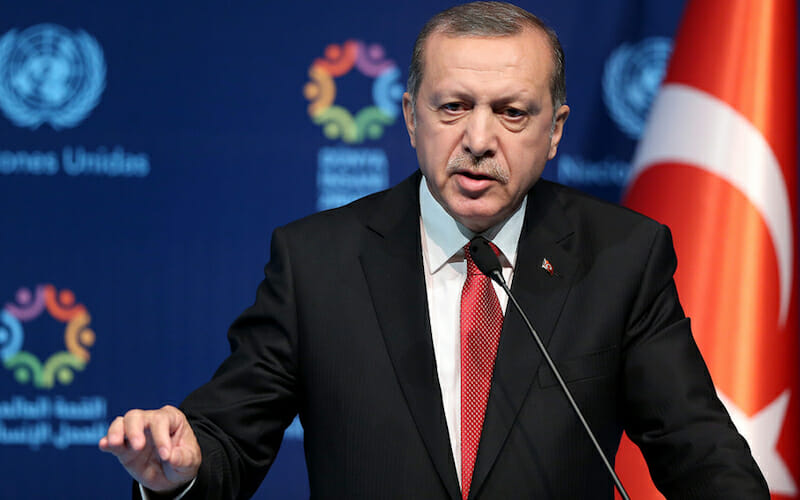
Turkey Suffers for Erdogan’s Insecurity
On July 31st, 1959, 28 months after the original six signatories, Belgium, the Federal Republic of Germany, France, Italy, Luxembourg, and the Netherlands, had signed the Treaty of Rome, Turkey applied for associate membership in the European Economic Community (EEC). Since that time, Turkey’s goal was to achieve full membership in the EEC, then, it became to obtain membership in the European Union (EU). The benefits that Turkish citizens would gain have been coveted for many years. Understanding that membership would threaten his leadership, Turkey’s President Recep Tayyip Erdogan has sought to dash that hope. Erdogan’s domestic and foreign policies have followed a line to deny that end.
For the first years of his tenure as prime minister, Erdogan pursued a line of opening up at home and abroad that was congruous with that of furthering Turkey’s candidacy. Erdogan invited Israel and Syria to Ankara to conduct peace negotiations. In 2004, to harmonize Turkey’s criminal law system with that of the EU’s members, Turkey eliminated the death penalty.
Erdogan’s ostensible change of course became evident by 2007, when his Justice and Development Party (AKP) captured a parliamentary majority in that year’s general elections, notwithstanding the failure to capture a majority at the polls. Emboldened by his parliamentary majority, Erdogan considered himself able to begin a program by which he could not be restrained by the governing human rights norms of the EU, notwithstanding the benefits for Turkey’s citizenry.
Erdogan’s career has not been easy. In spite of being a successful politician, having honed his skills in party politics as the mayor of Istanbul, where he built the AKP into a well-functioning political machine. Nevertheless, he has been harried by legal problems: investigations ranging from corruption to threatening the state, for the latter he was incarcerated for incitement to violence and religious or racial hatred. In the course of time, his sons Bilal and Burak Erdogan became targets of investigations in Turkey, subsequently, Bilal, in Italy, for money laundering. Recep Tayyip Erdogan began to claim that he was being victimized by a wide coalition of enemies inside the state, which led him to refer to a “deep state”: a set of machinations of the judicial system, the state bureaucracy, and the armed forces that was conspiring with the opposition and ethnic minorities in league with foreigners. This mass of opposition that was embarked on thwarting his rule, which Erdogan identified as the national will, took shape in his mind as he set in motion the Ergenekon Trial: a conspiracy prosecution of 250 individuals with little in common who belonged allegedly to a secret organization called Ergenekon.
The trial and subsequent appeals lasted from 2008 to 2016, nevertheless, it showed the resiliency of the Turkish justice system and resulted in no convictions. Furthermore, the court declared that the prosecution had failed to show the existence of Ergenekon itself. The trial was maligned in the press. It shook Erdogan’s confidence and made him aware of how much remained outside of his control. As he has sought to justify himself, Erdogan has not tired of referring to Adnan Menderes, who had been overthrown in the coup d’état of 1960. Menderes, whose Democrat Party had captured three strong victories at the polls, garnishing 51%, 54%, and 48% of the votes cast respectively in 1950, 1954, and 1958, sought to capture the organs of the state and remained in conflict with the armed forces and the civil service. In his last years, Menderes established the parliamentary Investigatory Commission with the goal of eliminating the leading opposition party, the People’s Republican Party, which was closely identified with the civil service and the military, as well as the founding of the Republic of Turkey.
To strengthen his domestic power, as well as his position in negotiations over Cyprus, Menderes inflamed the existing hatred against the Greeks by instigating the 1955 two-day pogrom against Istanbul’s Greek community, in which the Armenian and Jewish communities suffered as well: one of the crimes for which he was charged, found guilty, and hanged. Subsequently, amongst members of the right, Menderes achieved a cult of martyrdom with which Erdogan has identified on a personal and public level. Erdogan has accused his own opponents of being like the people who had hanged Menderes and who belittle the national will.
Notwithstanding, his ability to win votes, but one measure of a functioning democracy, Erdogan’s frustrations domestically and externally have augmented his inability to tolerate opposition and accept responsibility for failure. In response to the anger and charges of the lax enforcement of safety regulations engendered by the mining disaster in Soma of 2014, to defend his concern for miner’s safety, Erdogan cited three British mining disasters of the nineteenth century, a United States death-laden accident of 1907, and a Chinese tragedy of 1942 in which 1549 miners perished.
In the Middle East, Turkey contends with a restive domestic Kurdish population, which has endured decades of cultural and political repression, resultant long periods of a civil war, and the constant threat from the breakdown of Iraq and the Syrian Civil War, which have occasioned the presence of over three million refugees in Turkey. For some time, Erdogan has nourished nostalgia for the Ottoman Empire, which for over three centuries ruled the Asian Middle East west of Iran, and at its greatest extent ruled all of North Africa to Morocco and the Balkan Peninsula, with two sieges of Vienna, the first, in 1529, and the second, in 1683. As he opines favorably on Ottoman rule, it is remembered that during the 38 years before 1914, the Ottoman Empire’s subjects suffered a 90% illiteracy rate, and, but for brief effusions of parliamentary rule, there ruled Sultan Abdülhamit II, who governed a nascent modern police state, later, the triumvirate of Enver, Cemal, and Talât, who led the empire into the disaster of World War One.

The use of Ottoman rhetoric and distrust of republican symbols shed light on Erdogan’s anger and need to suppress with violence the demonstrations against the demolition of a city park in Istanbul in 2013. Gezi Park, which stands on the site of a razed Ottoman army barracks and had been slated to be converted into a faux Ottoman shopping mall, perhaps as a counterweight to the Atatürk Kültür Merkezi, a republican institution par excellence that dominates the east end of the same plaza, Taksim Meydanı, adjacent to Gezi Park.
Erdogan responded rapidly to the attempted coup d’état of 15 July, 2016 and used it to strike at his opponents. The coup resulted in about 260 deaths and more than 2000 wounded. Nevertheless, the quality of its planning and execution led to its suppression in less than a day’s time. The coup lacked popular and institutional support. Subsequently, it was condemned widely domestically and internationally, in particular in Europe. Both the populace and the military had experienced coup fatigue. In particular, the military had seen coups as harmful to its image and detrimental to Turkey’s entrance into the EU. Whereas, many successful coups take place between one o’clock and five o’clock in the morning so that a country may awake to a fait-accompli, the instant coup began on a summer’s evening at 9:30, when many people were outside with cell telephones and smartphones in hand. No proper plan had been made and executed for the capture of the head of state, Erdogan, who immediately used the social media to rally his followers against the coup.
Soon thereafter, with an eye toward Europe, Erdogan said that he was reconsidering reinstating the death penalty. The day of the coup has become a national holiday, Democracy and National Unity Day (Demokrasi ve Milli Birlik Günü), and Prime Minister Binalı Yıldırım deemed the event’s importance as commensurate with that of the Battle of Manzikert of 1071, which undermined Constantinople’s control of the east and led to the eventual Turkish capture of Anatolia. Very soon thereafter, there were mass travel prohibitions, dismissals from employment, arrests, and closings of organizations. By April of 2017, the government had dismissed 140,000 state employees, arrested 40,000 people, jailed 152 journalists and twelve parliament deputies, purged one third of the judges and prosecutors, and shut down 150 news organizations and 1500 civil associations. Erdogan, who saw the hand of his former ally Fethullah Gülen in the coup, has claimed that he is acting to extirpate from the Turkish body-politic the shadowy organization of Gülen’s followers. In spite of his repeated demands that the United States extradite Gülen, Ankara has not provided Washington the evidence that would merit an extradition hearing. Nevertheless, Erdogan has used the state organs to strike beyond the individuals who may have been involved with the coup.
It was in this climate of a then nine-month state of emergency that Erdogan staged the April referendum to make constitutional changes to grant greater powers to the president of the republic. Although, Erdogan’s program for changes received 51.4% of the votes, the referendum was marked by irregularities, including a claim that three million ballots lacked an official stamp. Given the conditions under which the referendum was held, the Organization for Security and Cooperation in Europe criticized it for having been held “on an unequal playing field.”
Notwithstanding the challenges to the vote tally, 48.6% of the day’s voters had voted against the grant to Erdogan of increased power. Having curbed domestic dissent, the next month, the Turkish government deprived Turkey of access to Wikipedia, after the latter had refused to accede to Ankara’s demands concerning its content. By June, Erdogan enacted another measure to control Turkish students’ access to information by eliminating the teaching of evolution in the secondary schools.
Erdogan has extended into Europe and North America the reach of his security forces to suppress dissent. Currently, Switzerland’s Office of the Attorney General is investigating Ankara’s spying on the Swiss Turkish community. As a part of that investigation, it is examining Turkey’s alleged attempt to drug and kidnap a Swiss Turkish businessman. On a visit to Washington in May of 2017, members of his security detail consulted Erdogan, who remained in his car, then, assaulted a group of demonstrators on the other side of the street. Previously, Erdogan’s security detail had attacked demonstrators at the Brookings Institute and at the United Nations.
Erdogan’s insecurity with domestic opposition and his policy to suppress it are commensurate with his insecurity with foreign criticism of the treatment of his citizens. Cengiz Candar has stated that Erdogan’s foreign policy is related to a domestic agenda. Whereas he may be confident in controlling domestic opposition, he seeks to avoid any foreign commitment that may inhibit his ability to do so. Erdogan’s domestic policy and foreign policy have coalesced to debilitate Turkey’s candidacy for membership in the EU, so as to eschew foreign sanctions that may be beyond his control. The lesson of the EU member-state Poland illustrates this point. In December of 2017, the European Commission invoked against Poland Article Seven of the EU Treaty, accusing it of trying to undermine core democratic views, and applied sanctions with a warning that could lead to the suspension of voting rights. Erdogan is remembered for having said “Democracy is a tramcar, it goes as far as the place where we are going, there, we get off.” As in his domestic policy to sabotage Turkey’s candidacy for EU membership, so too, Erdogan has done in his foreign policy, so as never to find himself in Poland’s position.
Erdogan has provoked conflicts with Europe for short-term domestic gain with voters at the long-term expense of Turkey. In spite of European condemnation of the coup d’état of 15 July, 2016, when the EU’s High Representative for Foreign Relations and Security Policy Federica Mogherini stated “No country can become an EU member-state, if it introduces the death penalty,” Erdogan, in an early August interview of that year, castigated Morgherini for not having gone to Turkey, said that 57% percent of the Turkish public favored the death penalty, and listed 16 countries that still have capital punishment. In the same interview, on a personal level, Erdogan berated the Italian justice system for investigating his son Bilal Erdogan for money laundering, instead of pursuing the Mafia.
Before the April referendum of 2017, Erdogan met with accusations of fascist and Nazi tactics. Germany, Turkey’s largest trading partner and the largest place of residence of Turkish expatriates, and the Netherlands’ rebuffed his wishes to send cabinet ministers to campaign amongst the resident Turkish citizens for the “Yes” vote. With deeper international implications and for domestic nationalist incitement, on a state visit to Greece in December of 2017, the first by a Turkish head of state in 65 years, Erdogan called into question the 1923 Treaty of Lausanne with respect to Turkey’s borders with Greece, a member of the EU and a fellow member of the North Atlantic Treaty Organization. In his rhetoric and his negotiations with Europe, Erdogan considers that he has mollified the EU by raising the presence of the over three million refugees that he could release westward.
Notwithstanding the benefits that may accrue to Turkey’s citizens from EU membership, Recep Tayyip Erdogan’s insecurity has preempted the half-a-century struggle to achieve that goal.

